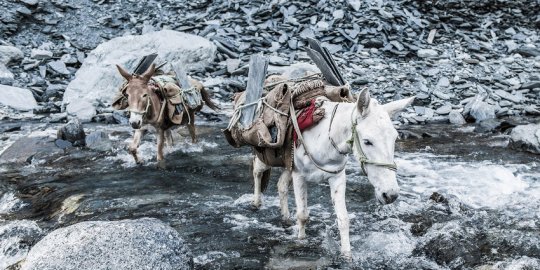Brooke India research
The Brooke India programme includes an active research team, working on topics relating to service providers and community engagement, equine clinical issues and policy-related topics. They aim to share details of their programme’s work at both the national and international level.
how glanders impacts on brick kiln communities
Glanders, a highly infectious and often fatal disease, is reportedly becoming the biggest health threat to equines working in brick kilns in India.
World Equine Veterinary Association (WEVA) 2013
Trypanosoma Evansi case series
Dr Syed Zaman presented a paper at the 2013 World Equine Veterinary Association (WEVA) conference in Budapest reporting a Surra (Trypanosoma Evansi) case series.
Using SEBWAT to measure improvements in equine welfare
Also at WEVA 2013, Dr Vikash Mishra presented a paper describing the use of Brooke’s welfare assessment tool, SEBWAT, to measure improvements in equine welfare.
Common dentistry problems
A poster at the same conference authored by Dr Dinesh Mohite described a series of dentistry cases noting the prevalence of common clinical problems recorded by Brooke field veterinary teams.
Brooke India has contributed content to several international colloquia on working equids which take place every four years. For the 2014 colloquium in London, their contributions included posters describing a range of programmatic and policy related topics.
International Colloquium on Working Equids in 2014
At the International Colloquium on Working Equids in 2014 in London, Brooke India contributed several pieces of evidence, including the following topics.
The benefits of community-led insurance
Mainstream insurance agencies in India are reluctant to provide equine cover. Can community-led insurance meet the needs of equine owners?
This poster won the best poster prize from the colloquium organisers.
The epidemiology of colic at India equine fairs
Clinical records of working equine animals diagnosed with abdominal pain at 12 equine fairs in India were examined. It was hoped that findings could be used to inform owner education programmes on colic prevention.
Owner-level foot care training impact assessment
Foot problems were identified as one of the main welfare problems affecting equine animals in 30 districts where Brooke works. Incorporating interventions to address both the demand for high quality farriery services, as well as programmes to ensure provision of such services needs to be evaluated.
Equine contributions to livelihoods in India brick kilns
For those who don't own land, a working equine animal can be a key source of regular income to sustain family livelihoods. Evidence of the contribution of such animals in these circumstances is required to inform engagement with policymakers about the importance of addressing the animals' welfare needs.
Community-led tetanus toxoid vaccination
In the past, free veterinary services including vaccinations were provided by Brooke India's programme teams for working equine animals. Community-led tetanus toxoid vaccination is an example of Brooke's new approaches based on a process of community empowerment designed to deliver a sustainable improvement in equine welfare.
Women as a new paradigm in working equine welfare
The interactions between working equine animals and women is poorly understood in India. A study was conducted in seven districts in Uttar Pradesh to investigate this synergistic relationship.
Equine Infectious Diseases Conference 2016
In April 2016, Brooke India presented work for the first time ever at the four-yearly international Equine Infectious Diseases Conference which was held this time in Buenos Aires.
Equine infectious disease
Their presentation shared the findings of a study into the infectious disease profile of equids in a particular community where trypanosomiasis was perceived to be the key problem. The abstract for their presentation was published in the Journal of Equine Veterinary Science.

